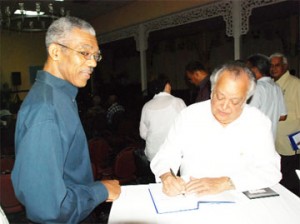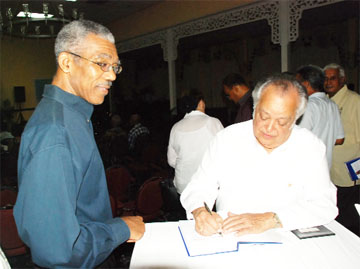The successful settlement of the Guyana/ Suriname maritime boundary dispute is a major victory for the United Nations Convention on the Law of the Sea (UNCLOS), strengthening the paramountcy of the international rule of law in securing peace resolutions, Sir Shridath Ramphal has said.

Speaking yesterday evening at the launching of his new book, Triumph for UNCLOS, Ramphal credited the maritime award handed down by the International Tribunal on the Law of the Sea (ITLOS) with ushering the two countries into a new era of neighbourliness and cooperation. “Thanks to UNCLOS and to the rule of law it imposes, dispute settlement by peaceful means was mandatory, and justice and equity ultimately prevailed,” he said.
Ramphal emphasised that the award served the peace of the world. It conclusively blocked the emergence of any large and dangerous hole in the fundamental rule of international law, Ramphal added, explaining that it prohibited the use of force in maritime areas no less than in territorial ones. “…The real winner was the system of international law that brought the two countries to the arbitral tribunal and to the peaceful resolution of their maritime dispute,” he said. “…It is a signal of wider import – that the threat and use of force in disputes between states is beyond the pale of lawful conduct,” he later added.
Ramphal spearheaded Guyana’s campaign after it initiated arbitration proceedings at the ITLOS for the delimitation of its maritime boundary with Suriname and it asked that Suriname’s use of threat and force against a CGX rig in June 2000 be declared a breach of international law. Both Guyana and Suriname are parties to the UN Convention for the Law of the Sea.
The tribunal awarded a favourable ruling to Guyana last September.
Ramphal said although the arbitral process took three years to complete, at the end of the process it ensured that 31,000 square kilometres of maritime space would be open for oil exploration that would benefit the region and the rest of the world.
Although the technical details of the dispute was in the public domain, Ramphal was equally cognisant that the proceedings and judgements in such instances seldom lend themselves to an easy understanding by laymen. He said he hoped the book would provide access to the complex and weighty arguments at the heart of the dispute.
Ramphal noted that the resort to force in Caribbean waters jarred the region just as it was developing the structures of community against a backdrop of a well-established system of the rule of law. He said while Caricom made efforts to restore a peaceful environment and arrangements for conducive to development, these were not allowed their potential. “UNCLOS came to the rescue of the parties and the region,” he declared, saying that it was fortunate that the convention offered a facility to pronounce on the illegality and provide a warning against similar temptations in the future.
Ramphal felt that the dispute resolution forum created by UNCLOS was one of the dimensions of the settlement that has yet to be completely appreciated. He explained that there would be situations in which states find it easier politically to accept the binding award of the tribunal rather than to take responsibility for negotiated settlement. He recalled that a few months before the Guyana/ Suriname decision was handed down, a similar judgement was made in the boundary dispute between Barbados and Trinidad and Tobago, and with the establishment of a maritime boundary between the two countries, he believed the region would be better off. “It is a costly alternative to negotiation,” he said, but costlier still could be an unresolved dispute.”
Former foreign minister, Rudy Insanally, who was the incumbent at the time of the arbitral process, formerly launched the book on behalf of UNCLOS, to which it is dedicated. He also presented a copy to Prime Minister Samuel Hinds.
In brief remarks, Insanally who was Guyana’s agent in the matter said that contrary to Sir Shridath’s view that the publication was a modest attempt to record history, it was a major contribution to legal scholarship. Recalling the history of UNCLOS and some of the successes it has achieved since it came into being, he said that it was significant that Guyana, which was the 60th country to ratify the convention, had to resort to it for the settlement of the maritime dispute with Suriname.
The session, which was well attended, was chaired by Sir Shridath’s friend of many decades Bryn Pollard.

